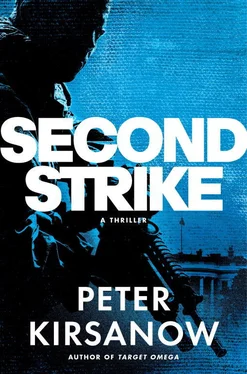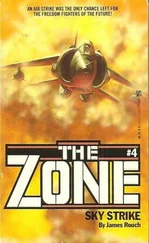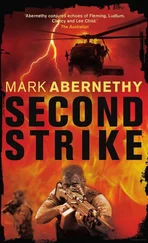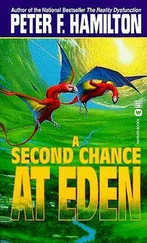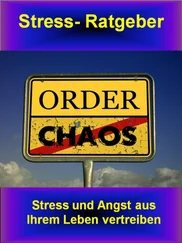“You do not really think that surprises me, do you?”
Bor snorted. “Take care, my friend.”
Before terminating the call, Stepulev noticed the Ford Explorer several car lengths to the rear. He recognized it as the same vehicle he’d seen a few minutes ago, the black man with the goatee driving.
“Prepare yourself, Ziad. You are next. We are being followed, so you will have to exit and get to the point as fast as possible. Remember to keep your hand on the detonator at all times. The White House snipers will be on high alert.”
“I am prepared.” The voice was frightened but determined.
—
Knox was becoming convinced that the car he was following was not going to meet any reinforcements, and its trajectory was in the general direction of the White House.
Isaac Coe apparently was thinking the same thing. “My vote is sooner rather than later, Congo.”
“That makes it two to nothing. I’m going to overtake them and force them to the curb. Mike said shoot first and forget about the questions, so take out as many as you can. Fire at will.”
—
Stepulev saw the car behind them increase in speed. He did the same, swerving around slower vehicles ahead of him. As they approached G Street, less than a hundred yards from the Old Executive Office Building, Stepulev pointed at the large gray building.
“I am going to stop up ahead, Ziad. Get out and run as fast as you can past that building and keep going toward the White House. You will see the press corps between that building and the White House. Get as close as you possibly can, just as we rehearsed it. Again, keep your hand on the trigger at all times.”
Ziad’s eyes met Stepulev’s in the rearview mirror and he nodded.
The Russian pulled the steering wheel hard to the left and jumped the curb as pedestrians screamed and scrambled to get out of the way. The vehicle slammed into the steel barriers and Ziad sprang from the rear door of the car toward the OEOB at a full sprint, dodging startled office workers in his path.
Knox slammed on the brakes, stopping near the Renwick Gallery approximately forty yards behind Stepulev’s car. “I’ll cover, Ike. Go after the runner. Fire discipline, but get him.”
Stepulev and the last windbreaker had gotten out of opposite sides of the vehicle, had shot two uniformed Secret Service agents, and were shielding themselves behind their respective car doors. Knox opened the driver’s-side door and dove to the pavement, rolling twice before settling on his stomach in a prone position, his Glock 17 extended before him. He fired four rounds toward Stepulev’s vehicle—two each slamming into the driver’s- and passenger-side doors. Without turning to Coe, he shouted, “Go!” and fired four more rounds, the last two shattering Stepulev’s passenger-side window and pulverizing the last windbreaker’s head.
Coe shot forward, firing a burst of three rounds in the general direction of Stepulev, who was crouched behind the door of the car. Within a few seconds Coe was already past the car and gaining on Ziad, the weight of the vest slowing the suicide bomber considerably. The operator heard a pop as a round zinged past his head from Stepulev’s weapon.
Panicked pedestrians ran in myriad directions, some diving to the pavement. Screams reverberated throughout the plaza as Coe chased the suicide bomber who was running toward the White House.
Coe could hear an exchange of gunfire between Stepulev and Knox behind him. Stepulev glanced behind him and saw that Ziad was in the detonation zone. The Russian pulled his cell phone from his pocket and pressed the key for Bor. “It is done,” he said. Then Stepulev emptied his entire magazine toward Knox and smiled in satisfaction just as two rounds from Knox’s pistol tore through the Russian’s chest and throat.
It was clear Coe would be able to close to no more than thirty yards of the suicide bomber before the latter reached the perimeter of the White House grounds. If the explosives in the bomber’s vest were as powerful as those set off by his compatriot at Union Station, lots of people were going to die in and around the most powerful edifice in the world.
—
Olivia had emerged from the OEOB moments before two vehicles jumped the curb and havoc ensued. She was caught almost equidistant between the OEOB and the White House, cell phone in one hand and a sheaf of documents in the other. She sank to a defensive crouch as she heard the rounds of gunfire, people screaming, and glass shattering. A man in a white windbreaker ran past from left to right about forty yards in front of her, heading in the direction of the White House. Approximately forty yards behind the windbreaker she saw a man chasing him. Though bewildered, her mind registered that it was Isaac Coe.
She remained frozen in a crouch as Coe sped by in pursuit of the windbreaker, who a second later came to a jarring halt, as if he’d run into an invisible brick wall. A fraction of a second later Olivia heard the sharp crack of the rifle fired by the sniper atop the White House. She saw the windbreaker stagger and spin as a second report sounded, his right hand clutching the front of his jacket.
Before Olivia’s brain realized that the atomized parts of the windbreaker had sprayed over her body, before she recognized that a small metal pellet traveling four hundred feet per second had torn through Isaac Coe’s left biceps, nearly severing his arm from the shoulder, Olivia felt herself being lifted from her defensive crouch by the force of the suicide vest’s massive blast.
The last thought she had before her body was violently deposited on the pavement nearly twenty feet away was that she’d always assumed she’d die on a cold winter’s day, not a hot one in August.
MOSCOW,
AUGUST 18, 9:30 P.M. MSK
The distraction was complete.
Mikhailov had gotten the news directly from Bor only minutes after the bomb had exploded outside the White House. Vasiliev had also relayed reports from intelligence officers stationed near the blast. Although it was far too early for accurate estimates, the casualties were likely to be in the dozens, including members of the White House press corps. That fact alone ensured it would be a major story. But combined with the earlier bomb at Union Station, the story was already building to immense proportions—so immense that nearly every intelligence resource at America’s disposal was being trained on the twin events, just as Mikhailov had expected. The media was already reporting the events as the work of jihadists.
Mikhailov hadn’t touched the vodka Vasiliev had provided. As with Egorshin, the presence of the alcohol served as a security blanket. The plan was on pace and progressing nicely. He needed nothing but his own resolve to calm his nerves.
Mikhailov tapped a key on his phone, and moments later Vasiliev entered the room.
“It is almost time, Alexei. Tell Stetchkin to give Volkov the order.”
“Yes, Mr. President.”
“We should expect verification of the results almost immediately, correct?”
“Yes, Mr. President. It should be a matter of minutes.”
“Upon receipt of verification, relay my authority to all responsible officers to proceed with their respective campaigns.”
Vasiliev smiled. Finally it was under way. “Yes, Mr. President. Anything else?”
Mikhailov lifted the glass of vodka from the table next to him as if he were handling a used tissue. “And take this with you.”
WASHINGTON, D.C.,
AUGUST 18, 2:48 P.M. EDT
Читать дальше
